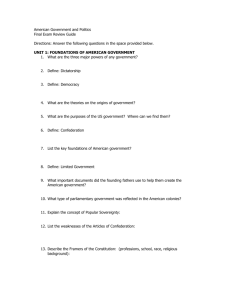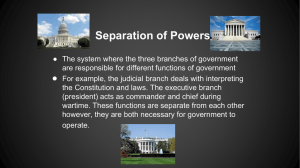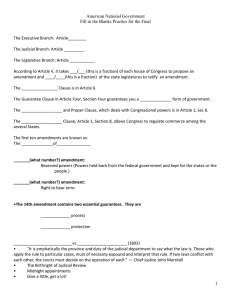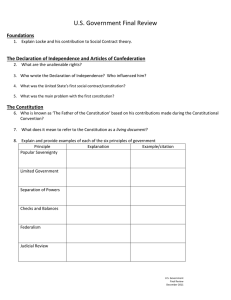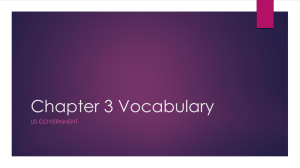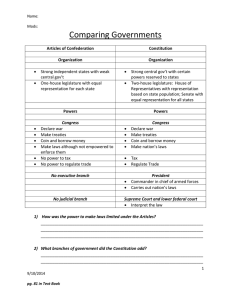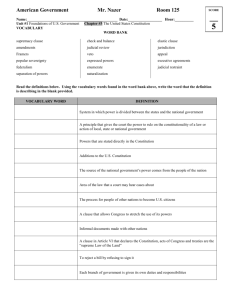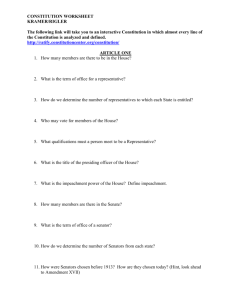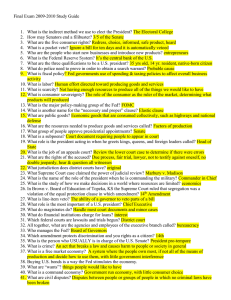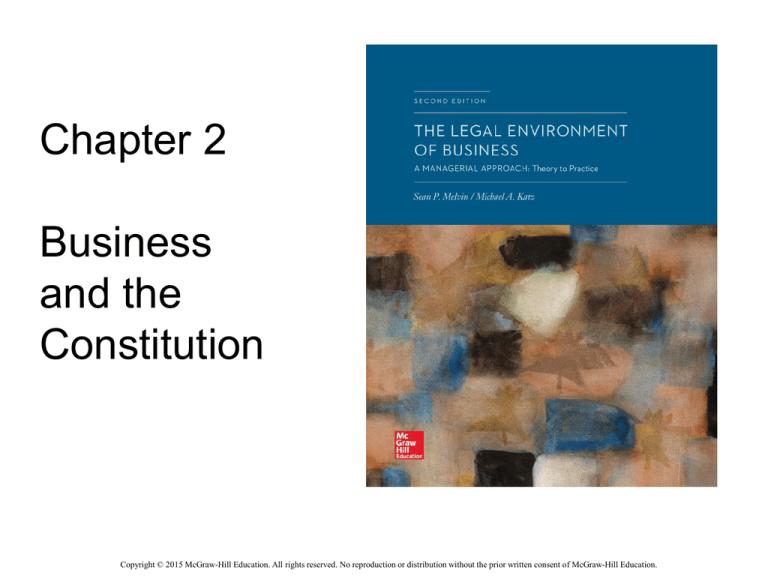
Chapter 2
Business
and the
Constitution
Copyright © 2015 McGraw-Hill Education. All rights reserved. No reproduction or distribution without the prior written consent of McGraw-Hill Education.
Functions of the Constitution
(1) establishing a structure for the federal
government and rules for amending the
Constitution;
(2) granting specific powers for the different
branches of government;
(3) providing procedural protections for U.S.
citizens from wrongful government actions.
2-2
Overview of Federal Powers
• Article III – Judicial Powers
– Judicial review
• United States v. Alvarez
– Separation of powers
• Executive
• Legislative
• Judicial
2-3
Standards of Review
• The U.S. Supreme Court has established
three standards of review for applying
constitutional law.
– Rational basis
– Intermediate-level scrutiny
– Strict scrutiny
• Brown v. Entertainment Merchants Assoc.
2-4
Supremacy Clause and Preemption
U.S. Constitution provides that valid federal
laws (those made pursuant to Congress’s
constitutional authority and that are
constitutionally sound) are always supreme
to any conflicting state law.
2-5
Commerce Powers
Congress’s broadest power is derived from
the Commerce Clause whereby Congress is
given the power to “regulate Commerce
among the several states.”
2-6
Tax and Spend Power
Congress has a far-reaching power to tax
the citizenry and to spend the federal
government’s money in any way that
promotes the common defense and general
welfare.
2-7
Necessary and Proper Clause
• Congress may also place conditions on
the use of federal money in order to
achieve some public policy objective.
• Congress generally cites the Necessary
and Proper Clause as authorization to set
conditions on the spending.
2-8
First Amendment
• “Congress shall make no law”
• That allows government encroachment in
the areas of religion, press, speech,
assembly, and
petition of grievances.
2-9
Speech by Corporations
• Commercial Speech
– R.J. Reynolds Tobacco v. Food and Drug
Administration.
– Bad Frog Brewery, Inc. v. N.Y. State Liquor
Authority
• Political Speech
• Which can be regulated?
2-10
Fourth Amendment
The U.S. Supreme Court has systematically
applied a reasonableness test to define the
limits of when the government may search
without a warrant based on probable cause
that criminal activity is possible.
2-11
Fifth Amendment
This amendment does not apply to
corporate entities when the government is
seeking certain business records, individual
corporate officers and employees are
entitled to Fifth Amendment protection when
facing a criminal investigation.
2-12
Due Process Protections
• Fifth and Fourteenth Amendments
• These clauses protect individuals from
being deprived of “life, liberty, or property”
without due process of law.
2-13
Equal Protection under the 14th
Amendment
• Fundamentally, the clause guarantees that
the government will treat people who are
similarly situated equally.
– What level of scrutiny should be used when a
law discriminates based on a suspect
classification?
– How about a semi-suspect classification?
2-14
Privacy
• Although not explicitly mentioned in the
Constitution, privacy rights play a central
role in our legal system.
• Common law origins
• Statutory law examples
2-15

